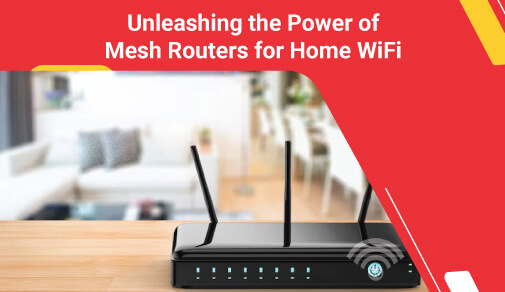Mesh Routers for Home WiFi
-
0
-
-
3 minutes

In today's interconnected world, having reliable and seamless WiFi coverage throughout your home is crucial. Traditional WiFi extenders have been the go-to solution for expanding WiFi range, but now there's a new player in town: Mesh routers. In this blog post, we will delve into the world of Mesh networks, understand how they differ from WiFi extenders, and explore the benefits they offer for creating a robust home WiFi system.
1. Understanding Mesh Networks
A Mesh network is a home WiFi system that consists of multiple interconnected devices or nodes, all operating under a single WiFi network name (SSID). Each node serves as a router, creating a seamless network that covers a larger area of your home. These nodes communicate with one another, ensuring a strong and consistent WiFi signal throughout your entire space.
2. WiFi Extenders vs. Mesh Routers
WiFi extenders, also known as WiFi boosters, work by rebroadcasting your existing WiFi signal to extend its range. While they can improve coverage, there are limitations. WiFi extenders typically create a separate network, requiring users to manually switch between networks as they move around the house. This can result in interruptions and inconsistent connectivity.
Mesh routers, on the other hand, offer a more sophisticated solution. Each node in a Mesh network is seamlessly integrated into the existing network, ensuring a unified WiFi experience. Mesh routers dynamically select the optimal WiFi channel, avoiding congestion and providing fast and reliable bandwidth throughout your home. With features like band steering, users can roam between rooms without experiencing buffering or the need to switch network names (SSIDs).
3. Advantages of Mesh Routers
a. Enhanced Coverage: Mesh routers provide greater coverage compared to traditional WiFi extenders. By strategically placing nodes throughout your home, you can eliminate WiFi dead zones and enjoy reliable connectivity in every room.
b. Seamless Roaming: With a Mesh network, you can move freely from room to room without any disruption or the need to switch between different WiFi networks. The system automatically directs your device to the node with the strongest signal, ensuring a seamless and uninterrupted connection.
c. Optimal Performance: Mesh routers utilize intelligent backhaul technology, whether wired or wireless, to ensure data travels efficiently between nodes. This results in fast and consistent bandwidth, allowing you to enjoy smooth streaming, online gaming, and other bandwidth-intensive activities.
d. Easy Setup and Management: Mesh routers typically come with user-friendly mobile apps that simplify the setup and management process. You can easily add new nodes, configure settings, and monitor network performance, all from the convenience of your smartphone.
Conclusion:
Mesh routers represent a significant advancement in home WiFi technology, offering enhanced coverage, seamless roaming, and optimal performance. Unlike WiFi extenders, Mesh networks provide a unified WiFi experience, eliminating the hassle of switching between networks as you move around your home. With their easy setup and management features, Mesh routers have become the go-to solution for users seeking reliable and expansive WiFi coverage throughout their living spaces.







